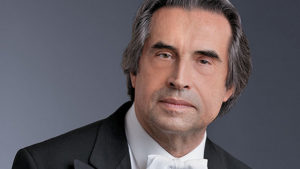
Artist Profile: Verdi Specialist Riccardo Muti
By David SalazarFew conductors have had such enduring and impactful careers as Italian maestro Riccardo Muti.
Born on July 28, 1941, the conductor studied composition and conducting at the Giuseppe Verdi Conservatory in Milan and would eventually work his way to principal conductor and music director of the Maggio Musicale Fiorentino.
Since then Muti has been everywhere. He was the music director at La Scala, the music director of the Philadelphia Orchestra, the music director of the Chicago Symphony Orchestra, and “lifetime conductor” of the Opera di Roma. He has appeared regularly at the Salzburg Festival and even created the Riccardo Muti Italian Opera Academy to help the development of young conductors.
He did suffer some challenges during his time at La Scala where he eventually lost support from the organization and forced to resign in 2005.
He is renowned for sticking to the score and the composer’s original intentions, even if it means doing away with tradition. This was a major change from his time with the Philadelphia Orchestra, wherein he did away with the then-famous “Philadelphia Sound” that had been instilled by the likes of Leopold Stokowski and Eugene Ormandy.
Major Interpretations
Muti is Verdi. The conductor has championed the composer throughout his career, taking on not only the classics but other rare works like “Atilla.” A unique feature of his recordings of the composer’s works is his adherence to the original score, the conductor reinserting traditional cuts and omitting high notes that were never written.
“Giuseppe Verdi was a composer who expressed the most essential feelings of mankind: love, hate, friendship, jealousy — everything that reflects our life, our way of being human,” he once stated in an interview regarding the composer. “His music is the mirror of who we are. Each of Verdi’s operas expresses human nature in such a profound way that we often recognize ourselves in Verdi’s characters… That’s why Verdi will always be of the moment, and he will never become old-fashioned. I feel certain that in 50 years, 100 years, 200 years, Verdi will still be a composer who speaks to people. His voice is universal.”
Read More on Muti
Two Instances When He Broke his Own Performance Rules
Watch and Listen
Here he is talking about “La Traviata,” which includes a unique perspective on the famous “Brindisi” from the first act.
And here is a legendary performance of “Macbeth.”
Categories
Opera Wiki

